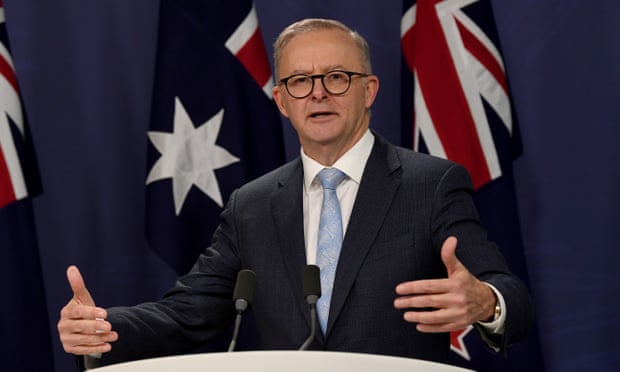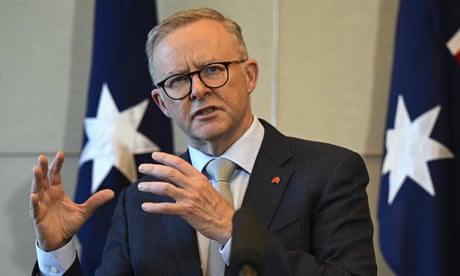Extract from The Guardian
Prime minister will open international forum in Sydney, saying the Indo-Pacific faces ‘enormous’ challenges but also opportunities.
- Follow our live blog for the latest updates
- Get our free news app, morning email briefing and daily news podcast

Tue 12 Jul 2022 03.30 AEST
Last modified on Tue 12 Jul 2022 07.58 AESTThe prime minister will open the Sydney Energy Forum on Tuesday before travelling to the Pacific Islands Forum in Fiji, where he hopes to progress Australia’s proposal to co-host a United Nations climate summit with Pacific neighbours.
The two-day forum in Sydney is being cohosted by the Albanese government, the International Energy Agency and the Business Council of Australia, with speakers including the IEA executive director, Fatih Birol, the US energy secretary, Jennifer Granholm and energy ministers of Japan and Indonesia.

Albanese will tell the event on Tuesday the Indo-Pacific region has a collective stake in effective action because the region was on the frontline of the climate crisis.
“We are the fastest-growing region in the world, home to more than half of the planet’s population, nearly two-thirds of the world’s economy, and more than 60% of global energy supply,” the prime minister is to say.
Albanese will say global heating is now a lived reality in Australia, where we “have experienced successive seasons of unprecedented bushfires and floods – again here in Sydney and its surrounding regions in the past week.
“We all recognise the enormous challenges of this moment in history, but while the task we face is great, if we act boldly and decisively, so is the opportunity.
“All of us here know what needs to be done. The nature of the challenge is not in question. Its urgency and scope is clear.
“The question is our ability and our appetite to seize the opportunities it contains and to shape them in our common interests.”
Albanese will tell forum that since winning the federal election on 21 May, he has focused on renewing Australia’s standing in the region and projecting a sense of a shared geographical community “with new clean-energy industries and jobs as its foundation”.
“The Indo-Pacific is the leading target for private investment in clean energy, accounting for nearly 80% of global investment in 2021, and this will only increase, because if the world is to reach net zero emissions by 2050, our investment in clean energy must more than triple,” the prime minister will say.
Meeting the forecast demand would necessitate a renewable energy supply around six times greater than our region’s current annual solar and wind energy generation, but “the numbers shouldn’t daunt us – they should energise us”.
Albanese will tell the event elements of the transition will not be easy.
“But I have no doubt that if we work tirelessly in common effort, we will achieve our common purpose.”
If the region builds on technological and infrastructure partnerships, new climate finance and huge developments like Sun Cable’s Australia-Asia PowerLink project, that would “create an enduring framework for a better future and an enduring legacy of the partnership between our Indo-Pacific nations”, Albanese will say.
Since winning the election, Albanese has used Labor’s more ambitious climate commitments to reset a number of relationships around the world that had been strained by the Morrison government’s inability to commit to a more ambitious 2030 emissions reduction target.
No comments:
Post a Comment